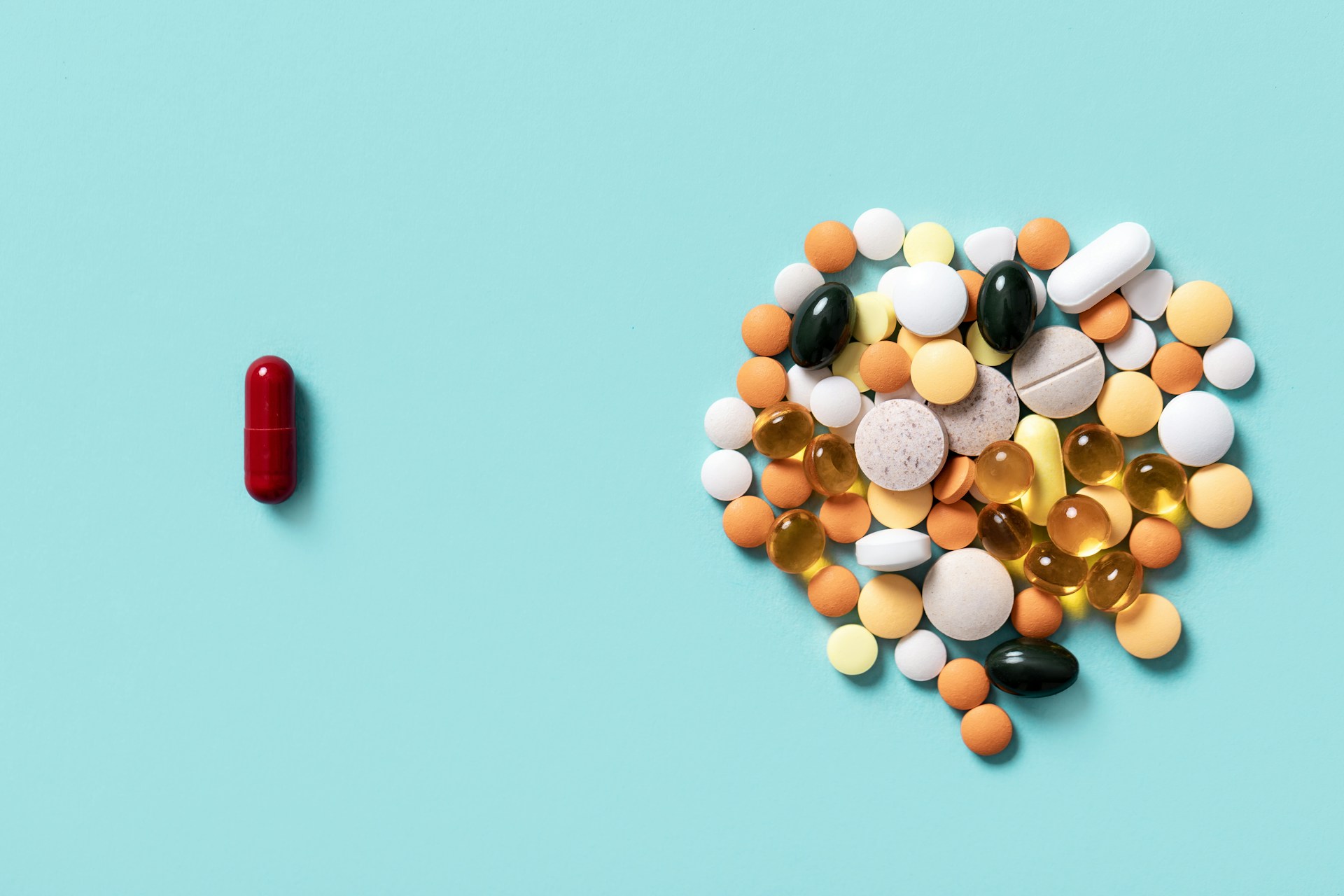Health
Boost Your Brain in 12 Weeks with Prebiotics

Maintaining brain health is a priority at all ages, but it becomes increasingly important as we age and the risk of dementia increases. While many strategies can help keep the brain youthful, recent research suggests that adding certain supplements to your routine could significantly improve your brain function in just 12 weeks.
Researchers at the School of Life Course & Population Sciences at King’s College London have discovered that two prebiotic plant fiber supplements, fructooligosaccharide (FOS) and inulin, can enhance cognition and muscle strength in adults over 60. This study, published in Nature Communications, highlights the potential benefits of these supplements for brain health.
Prebiotics, according to the Mayo Clinic, are foods that enhance the good bacteria in your gut, distinguishing them from probiotics. Inulin is a dietary fiber naturally found in plants, while FOS is a carbohydrate found in various plants such as onions, garlic, artichokes, bananas, and asparagus. FOS is also commonly used as an alternative sweetener.
The study aimed to assess the impact of these two prebiotic supplements on the gut microbiome, which has been suggested to play a role in muscle physiology and cognition as we age. A total of 36 pairs of twins were given either a placebo or a supplement daily for 12 weeks to understand this relationship.
“Participants taking the supplements also had fewer errors when taking a memory test.”
The results were promising. The group that received the fiber supplement outperformed the placebo group in tests assessing brain function, including an early marker for Alzheimer’s disease, the Paired Associates Learning test.
The study also reinforced the connection between the brain and the gut, often referred to as the gut-brain axis. After 12 weeks, the fiber supplements “led to significant changes in participants’ gut microbiome composition, particularly an increase in the numbers of beneficial bacteria such as Bifidobacterium.”
Mary Ní Lochlainn, a post-doctoral National Institute for Health and Care Research Fellow from the Department of Twin Research at King’s College London, expressed enthusiasm about the results. “We are excited to see these changes in just 12 weeks,” she said. “This holds huge promise for enhancing brain health and memory in our ageing population. Unlocking the secrets of the gut-brain axis could offer new approaches for living more healthily for longer.”
Senior study author Claire Steves, professor of aging and health, and clinical director of TwinsUK at King’s College London, emphasized the accessibility and affordability of these supplements. “These plant fibers, which are cheap and available over-the counter, could benefit a wide group of people in these cash-strapped times. They are safe and acceptable too,” Steves said.
However, the study did not find that the supplements had any effect on muscle strength during the 12-week period. Participants did resistance exercises and took a separate protein supplement “aimed at improving muscle function.”
The study was conducted remotely, with participants monitored via video and taking questionnaires and cognitive tests online. This method could be beneficial for future research as it eliminates the need for older adults to travel or visit a hospital.
Despite the promising findings, the study had some limitations, including a predominantly female participant pool and the inability to assess muscle mass due to the remote setting. The researchers also acknowledged the need for larger research projects to address digital literacy and access to technology.
Steves concluded that future research will investigate “whether these effects are sustained over longer periods and in larger groups of people.”
While the latest research provides valuable insights, it’s important to consult your healthcare provider before making any changes to your medication or health routine.
Let us know what you think, please share your thoughts in the comments below.

Health
Unlock the Secret to Preserving Memory: The Multivitamin Connection

Recent scientific studies suggest that regular intake of multivitamins might help in preserving memory as we age. Based on investigations involving more than 5,000 participants, a correlation was observed between daily multivitamin usage and a reduced rate of cognitive aging. “Compared to a placebo, taking a daily multivitamin slowed cognitive aging by about two years,” stated Dr. Chirag Vyas, a researcher at Massachusetts General Hospital.
These research studies form part of the broader COSMOS trial, which aims to ascertain the potential of multivitamins and a cocoa extract supplement in preventing heart disease and cancer. The focus supplement was Centrum Silver, and the studying method ranged from in-person cognitive evaluations to online tests.
It is essential to note that Pfizer (the producer of Centrum Silver) provided the multivitamins for the study, and Mars Inc. partially funded the COSMOS trial. However, both companies had no influence over the design of the trials.
Dr. Vyas, who led the third study, explained the recurring finding across the three studies: Daily multivitamin consumption had a slight beneficial effect on preventing typical memory loss associated with aging.
In scrutinizing the three studies, scientists concluded that consistent multivitamin intake seemed to improve global cognition (such as attention, reasoning, and planning) and memory recall in healthy older adults. However, the exact vitamins and minerals responsible for these potential cognitive benefits remain unknown, thus needing more comprehensive research.
Dr. Vyas said, “Future studies are necessary to identify the specific micronutrients contributing most to the cognitive benefits.” He also called for more research including racially and ethnically diverse subjects, as most of the previous participants were white.
As we age, the membranes of our brain cells (neurons) gradually deteriorate. According to Dr. Vyas, vitamins could potentially provide a shield against some of this deterioration.
However, Dr. Richard Caselli, a professor emeritus of neurology at the Mayo Clinic in Arizona, cautions against over-expectations based on the duration of these studies. “The amount of cognitive change that happens over the course of three years in healthy individuals who don’t have Alzheimer’s is pretty minimal,” he clarified.
In view of the study findings, Dr. Caselli sees no harm in recommending daily multivitamins to older patients, but he remains skeptical about their definitive impact on cognitive function.
Dr. Zaldy Tan, a geriatric medicine physician at the Cedars Sinai Jona Goldrich Center for Alzheimer’s and Memory Disorders in Los Angeles, suggested that individuals with vitamin-deficient diets might experience more noticeable benefits from multivitamin intake. Yet, it remains challenging to confirm if these improvements are directly attributable to the multivitamins or other factors.
Dr. Tan mentioned that deficiencies in vitamins A, B12, and E have been associated with cognitive health deterioration, although existing evidence is not exhaustive.
Dr. Caselli emphasized the significance of maintaining overall wellbeing to safeguard against cognitive decline. “A general rule of thumb is that everything that is bad for your body is bad for your brain and everything that is good for your body is good for your brain,” he advised.
As part of the same advice, he suggested people keep engaged socially and maintain mental and physical activity as they age. He recommended multivitamin supplements for those concerned about their dietary intake of essential vitamins and minerals. However, he stressed that while supplemental multivitamins could benefit individuals, they might not bring substantial advantage to those who already maintain healthy diets.
Let us know what you think, please share your thoughts in the comments below.
Health
Feeling Fatigued? Here Are 8 Signs You Might Be Iron-Deficient

Iron is a crucial mineral, serving multiple functions in our bodies, including aiding in the generation of red blood cells, fostering growth, and strengthening our immune system. A key role of iron is to assist in the production of hemoglobin, a protein in red blood cells, as explained by Dr. Daniel Landau, an oncologist and hematologist for The Mesothelioma Center.
He points out, “Our body requires certain vitamins and minerals as building blocks for our health. Our hemoglobin cells, which function to carry oxygen throughout the body, require iron, B vitamins, and folic acid specifically.”
Iron deficiency, one of the most prevalent deficiencies worldwide often flies under the radar, leading to potential health complications. According to Landau, “When our body is low in iron… decreased production of red blood cells can occur. When we have fewer red blood cells, the body cannot get oxygen in all the places that oxygen is required.”
How then can we ensure sufficient iron intake, given that our body cannot produce it? The American Red Cross (ARC) advises a balanced diet. They explain, “There are two types of iron in foods: heme iron and non-heme iron. Heme iron is found in red meat, poultry and pork and is most easily absorbed by your body. Non-heme iron is not as easily absorbed by your body but is still a good source of iron and essential if you don’t eat meat.”
Nonetheless, recognizing an iron deficiency isn’t always straightforward. The best way to know is through a blood test your doctor can perform, but there are also signs that you might not be getting enough iron.
Iron deficiency can lead to anemia, which significantly impacts energy levels, causing fatigue, says Landau. Registered dietitian Emily Van Eck explains this symptom often goes unnoticed, particularly in women. She says, “Fatigue and iron deficiency are both quite common in women, but they are not always tied together.”
Iron deficiency is also linked with heavy menstrual bleeding. Estimates from University College London indicate up to 90 percent of girls and women dealing with heavy menstrual bleeding are also iron deficient.
Abnormal cravings can also be a sign of iron deficiency, notes Landau. “Low counts of red blood cells can cause an added strain on certain organs… the body can go into a desperation mode, which can cause people to try and find iron in odd sources. This leads to Pica.”
Iron deficiency can lead to neurological symptoms such as headaches, difficulty concentrating, and dizziness, according to Van Eck. Furthermore, changes in skin color and nail condition, and an irregular heart rhythm can be indicators, too.
Tinnitus, or the experience of hearing a “whooshing” sound in your ears that aligns with your pulse, might also be a sign of low iron levels. It is wise not to self-diagnose or self-treat but report it, as suggested by Hoffman Audiology, a medical group in Irvine, California.
If you’re experiencing any of these symptoms, reach out to your healthcare provider. They may recommend a change in diet, supplements, or treatments for any underlying issues causing the iron deficiency. Ensure to communicate your health concerns with your doctor and together, develop a plan to maintain your health.
Let us know what you think, please share your thoughts in the comments below.
Health
Fresh Concerns: Top 12 Produce Items High in Pesticides

As we seek the nutritional benefits from our fruits and vegetables, it’s crucial we remember to consider the effects that pesticides can have on our health. A report published annually by the Environmental Working Group (EWG) serves as a stark reminder. This report, known as the “Dirty Dozen”, outlines the top 12 fruits and vegetables with the highest levels of pesticide contamination.
For its 2024 edition of the “Dirty Dozen”, the EWG based its findings on data from tests conducted by the U.S. Department of Agriculture (USDA) and the Food and Drug Administration (FDA) on 47,510 samples, encompassing 46 different types of fruits and vegetables.
While the USDA and FDA both wash produce before testing, the methods differ. The USDA peels or scrubs and washes samples, while the FDA only removes dirt. Despite these efforts, the tests still uncovered 254 pesticides.
Pesticides are substances engineered to destroy pests such as insects, weeds, and mold. The EWG emphasizes that even after a thorough washing, traces of these potentially harmful chemicals can persist on your fruits and vegetables. Studies have linked some of these pesticides to serious health concerns like cancer, hormone disruption, and cognitive and behavioral problems.
The report highlights four pesticides (fludioxonil, pyraclostrobin, boscalid, and pyrimethanil) which were frequently present in the tested produce. These are also classified as fungicides. Alexis Temkin, PhD, the senior toxicologist at EWG, warns, “Emerging evidence suggests many widely used fungicides may disrupt human hormone systems.” She also calls for more studies to better comprehend the risks posed by these chemicals, particularly to children.
The EWG suggests buying organic produce as a way to circumnavigate the potential risks associated with the contaminated items on the “Dirty Dozen” list. And so, allow us to reveal which 12 fruits and vegetables have made the unenviable list in this latest report.
First, green beans. According to the EWG, these may contain traces of acephate and methamidophos, two insecticides associated with harm to the developing nervous system. Next, blueberries retain their position from the previous year at 11th place, with concerning traces of phosmet and malathion (organophosphate insecticides) which can be harmful to the human nervous system, especially in growing children.
Over 90% of cherry samples were found to be laced with residues from two or more pesticides, alarming ones being pyraclostrobin (linked to liver toxicity and metabolic disorders) and boscalid (associated with cancer and thyroid dysfunction). Bell and hot peppers were found to be contaminated with an astounding 101 unique pesticides.
The report further highlights the prevalence of pesticide contamination in apples, nectarines, pears, peaches, and grapes. Pears, in particular, showed a worrying increase in the number of chemicals found. Spinach and a trio of greens (kale, collard, and mustard) also make the list with spinach testing positive for an average of seven different pesticides.
And finally, topping the list, are strawberries. They have been identified as the fresh produce most likely to carry pesticide residues, despite being rinsed and washed before consumption. Beware, as these sweet morsels come with a hidden cocktail of pesticides, some of which have been linked to cancer and reproductive damage.
Stay educated about your food. The key takeaway here isn’t to avoid these fruits and vegetables altogether but rather to make informed purchasing decisions, considering organic choices when available and giving your produce a good wash before consumption.
Let us know what you think, please share your thoughts in the comments below.
-

 Health7 months ago
Health7 months agoPreventing Falls and Injuries for Seniors
-

 Nutrition4 months ago
Nutrition4 months agoThe Aging Secret of Vitamin D Unveiled
-

 Nutrition8 months ago
Nutrition8 months ago5 AMAZING Dinner Recipes That Are Also HEALTHY
-

 Health5 months ago
Health5 months agoDownsizing Tips: Simplifying Your Lifestyle
-

 Health3 months ago
Health3 months agoBoost Your Heart Health: Simple Tips for Seniors
-

 Health5 months ago
Health5 months agoRespiratory Health: Breathing Exercises for Seniors
-

 Movement5 months ago
Movement5 months agoChair Exercises: Staying Active While Seated
-

 Health2 months ago
Health2 months agoKate Middleton’s Health: Royal Recovery, Photo Controversy and Public Speculation